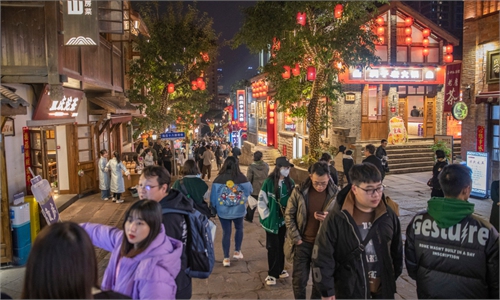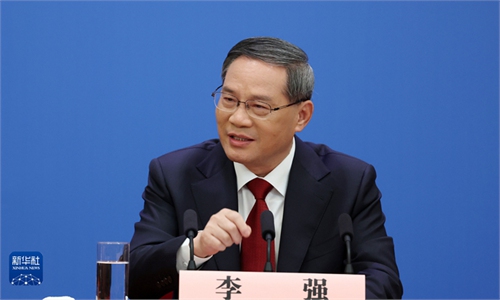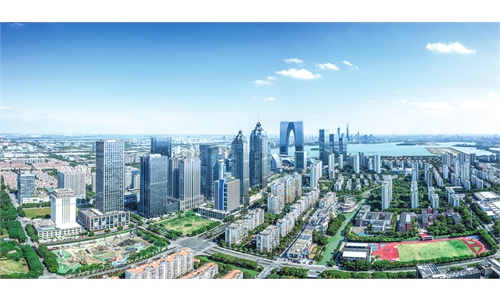

A view of Shenzhen, a tech and innovation hub in South China's Guangdong Province Photo: VCG
Editor's Note:
Since the outbreak of COVID-19 pandemic in early 2020, the global economy has encountered multiple turbulences and challenges. Now, some people in the West seem to question the Chinese economy, even comparing the current status of the Chinese economy to that of Japan in the 1990s. Faced with this doubt about the prospects of China's economic development, Yao Yang, dean of the National School of Development, Peking University, shares his views on the growth potentional of China's giant economy.

Yao Yang Photo: Courtesy of National School of Development, Peking University
Impacted by the COVID-19 pandemic, China's economy has experienced ups and downs over the past three years. As headwinds have also emerged in the external environment, notably the US' continued economic "decoupling" push, some began to question China's economic potential.
However, from the perspective of technology innovation cycles, China's economy still has huge potential and is actually entering a "golden age" of growth.
Progress in technology is a fundamental driver of economic growth. Over the past three decades, China, from a relatively low starting point, did not completely grasp the opportunities brought by the "new economy" - new, high-growth industries that are on the cutting edge of technology. In the internet economy, which the US plays a dominant role, latecomer China has seen rapid development and even earned leading position in some area. In a way, China has basically caught up with the previous round of technology cycles.
Riding on a new wave of technology, China is at the forefront in AI, new energy, electric vehicles, biomedicine and other major fields. This is probably the first time that China has stood at the forefront of global technology in an all-round way, and even has an absolute leading position in some fields, with an overwhelming advantage.
In the new energy sector, China's local production, such as solar energy equipment, accounts for more than 70 percent of global output, and many foreign companies related to solar cells have been acquired by China, according to new energy industry insiders. Chinese companies occupy a dominant position in the sector.
In the field of AI, although China seems to be a bit behind the US in terms of core technology including algorithms, the gap is now within one technology generation. China is ahead of other countries in the world in the application of AI, such as smart cities. China's advantages in electric vehicles are even more obvious. The production of electric vehicles in China accounted for more than 60 percent of global output in 2022, and this year this number will increase to more than 10 million.
Regarding the rising concerns in external environment of China's economy, there have been more emotional reactions than rational analysis. Generally speaking, the external influences of developed countries entering a period of recession, the crisis in banking systems of Western countries, and the ongoing conflict between Russia and Ukraine are all controllable. In addition, the US' technology "decoupling" push, which everyone is most concerned about, will also have a relatively controllable impact on China.
Admittedly, the US is intensifying technology decoupling with China, as the past restrictions implemented by the US have not achieved Washington's desired effects. The impact of the US "small yard, high fence" strategy is relatively controllable for China. For example, there are some 640 out of more than 10 million Chinese companies being placed on the US' entity list. The real impact at the economic level is actually limited.
More importantly, when a country out-competes another country in technology, the second mover always overtakes the leading country in grasping a new generation of technology. China's advantage in the field of electric vehicles is a typical example. Western enterprises in some traditionally strong industries like combustion-engine cars may be unwilling to give up established technology advantages amid technology upgrading, which may lead to them moving backward during a new round of competition.
Now the US has waged a chip war against China, but now technology upgrades in the chip field are also undergoing. The US' intensifying restrictions will undoubtedly have substantial impacts on Chinese companies, but the current electronic chip is likely to be replaced by photonic chip, which has a larger channel capacity and lower energy consumption, in the near future. At that time, in the new track of competition - the field of photonic chips - China will definitely be in the first camp in the world.
Therefore, even at the moment of the most intense competition between China and the US, when the US spares no effort to stifle China's technological progress and contain China's economic development, China should not lose confidence. China's economic development still has bright prospects.
The article was compiled based on a recent speech on China's economic prospects by Yao Yang, Dean of the National School of Development, Peking University. bizopinion@globaltimes.com.cn



